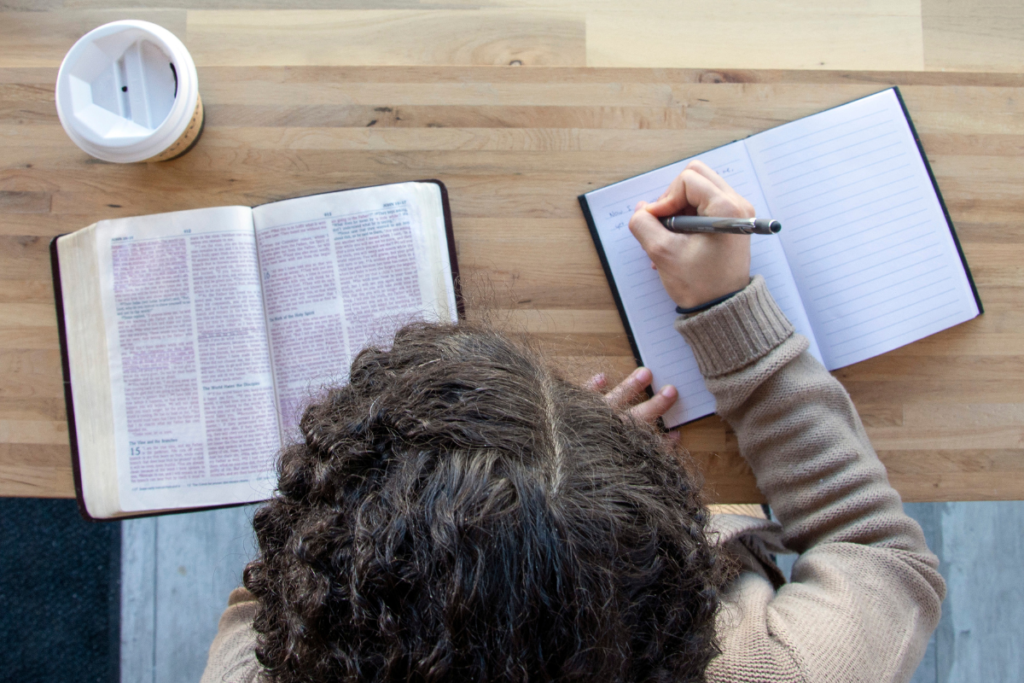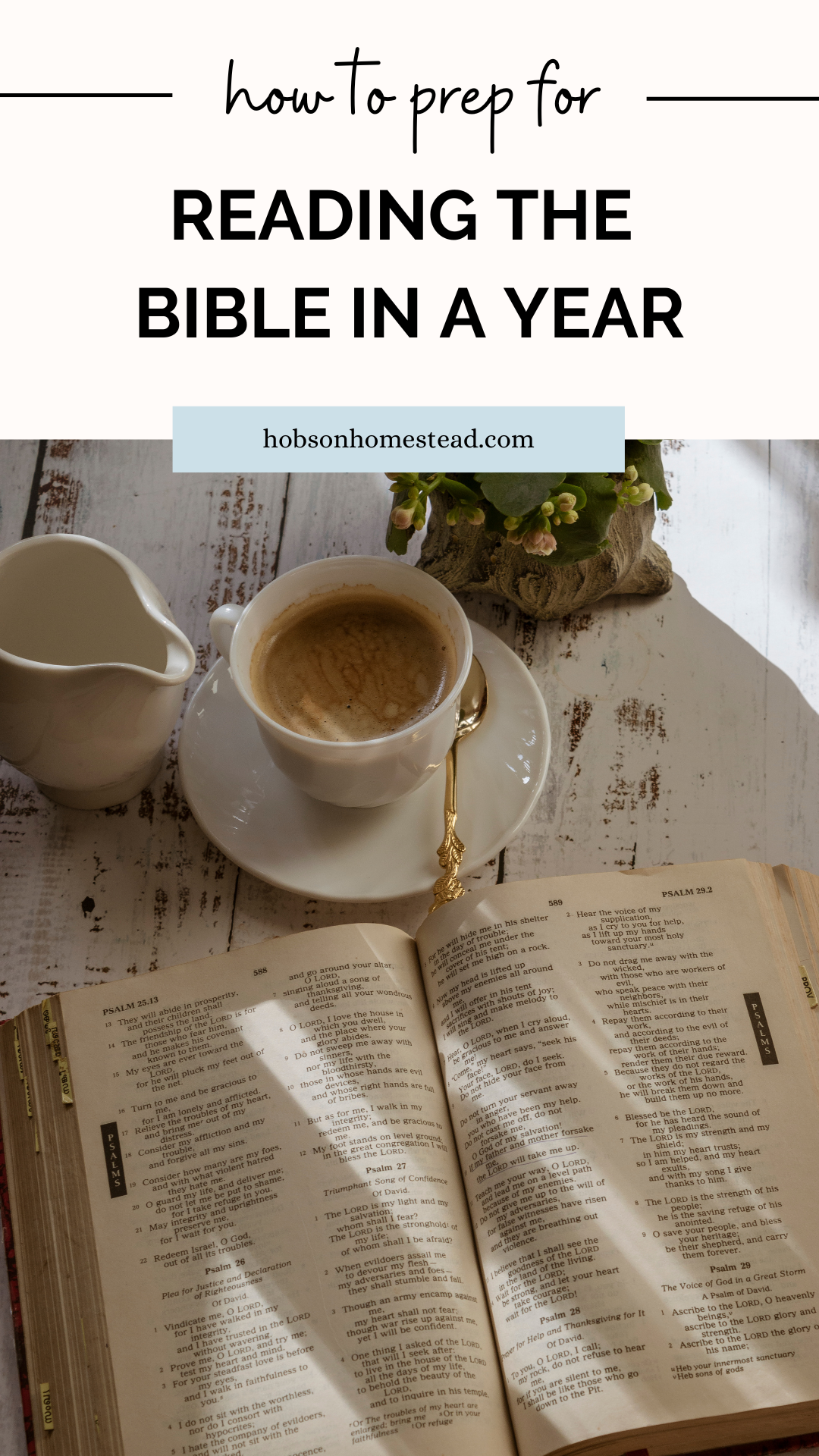From re-prioritizing your time commitments to engaging with the text daily, here are ways for you to prep for reading the Bible in a year.
I hate to admit that it wasn’t until my late thirties that I could finally attest to reading the entire Bible. In 2020, I set out with the goal of reading the Bible chronologically in a year and I finished right on schedule by New Year’s Eve that year.
Related: Christian Goal Setting: How to Set Goals for the New Year
I won’t say that each day’s readings were a breeze, because wading through some of the sections of the Bible was mentally taxing. For instance, there are 25 genealogies in the Bible, many with foreign names that make it is super easy to skim over quickly. And understanding the meanings of books such as Revelation and some of the major and minor prophets left me perplexed as well.

But as Isaiah 55:11 says, God’s word never returns void. And I truly believe that and pray that every subsequent year that I read through the Bible, I grow to understand God’s word more and that He reveals more of Himself to me.
If you’re considering reading the Bible in a year, here are my tips for a successful year of not just reading God’s word, but learning more about who God is throughout history and in your own life.
Choose a Reading Plan and Translation
A quick search on the internet will yield hundreds of Bible reading plans that you can easily follow. Some pair an Old Testament passage with a New Testament passage each day. Some have you read every day while others only have you read 5 days a week. Some plans go through the Bible as it is ordered and some are chronological.
My personal preference is to read the Bible chronologically to understand the timeline and historical and cultural context of its books. My first time reading the Bible in a year, I used my own Bible and printed out the reading plan from The Bible recap, then followed up my daily readings by listening to a short podcast playlist (click here for Sign Language or Spanish).
This time, I am using The One Year Chronological Bible, Expressions so that I can jot notes in this Bible instead of an accompanying journal and really mark up its pages.
So far, I have used the New Living Translation in reading the Bible in a year because of its readability and ease of understanding. As I continue to read the Bible in subsequent years, I would love to use the English Standard Version because many of the verses I memorize are in this translation. I’d also love to try the New King James Version because I love the way much of the poetry in the Bible is written.

Prioritize Your Time
One of the most important ways you can prepare for reading the Bible in a year is to set aside consistent time each day for reading. As a mom of four, I know how difficult this can be. A few years ago, I really committed to waking up before my kids to read the Bible because I knew it was the only time during the day when I would be guaranteed to have consistent alone time.
Thankfully, I’m a morning person, so waking up at 5 a.m. each day isn’t too hard for me (especially since I can drink my coffee in peace while reading). If you’re not a morning person, your routine may look different. When I was working full time, I remember using my lunch break to read and study. If you’re a night person, maybe you can read after your kids go to bed.
One other tactic that really helped me stay on track was to put away any distractions. I got up early so I wasn’t distracted by my kids. But I also left my phone in another room while I was reading and relied solely on the physical text of my Bible so I could really focus.
Accountability is another great way to stay on track with daily reading. If you know others who are willing to read the Bible in a year alongside you, it helps to motivate you to prioritize daily readings and also gives you someone to talk to about what you’re learning, what is confusing, what is convicting, etc.
Engage with the Text
Though some days were tougher than others when it came to reading the text, I found that if I jotted down notes, stopped to define tricky words and recorded my learnings, I was much better at concentrating on the day’s passages.
This year, I’m focusing on the practice of reading the Bible exegetically. Exegesis simply means studying the original and intended meaning of a passage. So instead of reading scripture and jumping ahead to how everything applies to me (I’m prone to this, especially in the New Testament!), it’s about looking at the historical and cultural context of the times and first looking at what it says about God and what God was relaying to those people in the Bible.
Author and speaker Jen Wilkin goes over this in depth in Women of the Word (Amazon book, YouTube audio book). She also has a quick video playlist called How to Study the Bible with Jen Wilkin.
Her 5 basic contextual study questions include:
- Who wrote it?
- When was it written?
- To whom was it written?
- In what style was it written?
- Why was it written?

Beyond these historical and cultural questions, another way to engage with the text of a biblical passage is to ask:
What does it say?
Tips to figuring out what the text says include reading it repetitively, annotating the text, defining keywords, referencing other translations and creating an outline of the passage.
What does it mean?
To determine what the text means, you should try checking cross references, paraphrase parts of a passage and apply it to your own life by considering how it would change you.

Priscilla Shirer also has some great tips for studying the Bible, which she outlines in this 5-minute video:
- Position yourself to hear from God.
- Pore over the passage and paraphrase the major points.
- Pull out the spiritual principles.
- Pose the question.
- Plan obedience and pin down the date.
Embrace the Routine
Apart from committing to a consistent time each day to read the Bible, I also find it helpful to read in a consistent place. This comfortable location on my couch with a cup of coffee beside me sets the mood each morning as I wake up to read and study God’s word.
Even on days when I’m tired, mentally distracted, pseudo sick or have a busy day, I embrace the routine of waking up early and going to my daily spot to read. Thankfully, the Bible promises that God’s mercies are new every morning (Lam. 3:22) despite my personal circumstances. My mind and body are in such a habit that they naturally crave this time meeting with God and reading His word.
As I implied before, not every day of reading is easy and not every day am I completely focused (humanity at its finest). But my morning routine makes it easy to get up early day after day, even when I’m unsure of the deeper meaning of passage or feel like I’m rushing through the reading one day. I try to do the next right thing by honoring that time set aside for Him and just pray that He will speak to me despite my human distractions.
Postpone the Commentary
Though I love the notes and resources in my study Bible, I think it’s useful to postpone consulting commentary and study notes until you first try to discern what the Bible is saying for yourself. Doing this slows down your reading and increases your study time a bit, but digging through a passage and wrestling with its intended meaning is a part of the learning and growth process.
By studying the Bible exegetically, I research the historical and cultural context before I start reading a specific book. But once I begin the book, I put the commentary aside until after I really dig into a passage for myself. Once again, there is definitely a place for commentary and study resources, but it’s after reading and mulling over the text for myself.

Meditate on Passages Daily
When I’m reading multiple chapters of the Bible each day, I like to ponder on a portion of the passage that really stuck out to me. I often think about what it says about who God is as well as what it means for my life as a Christ follower. Many times, I’ll mention something interesting I read to my husband, who always has unique insights on scripture.
One of my favorite ways to meditate on scripture, especially if I am trying to memorize it, is to pray that scripture. It’s amazing not to use my own words to pray to God, but use His words to speak to Him as a reflection of my heart. The book of Psalms offers many options for praying scriptures, such as Psalm 119:33-40.
Other ways to meditate on scripture include repeating a verse to yourself throughout the day, drawing or coloring imagery of a verse, diagram a specific verse, research commentary of a passage and more.
Pray
Besides praying scripture, praying before I begin and/or as I end my daily reading has been helpful by my honing my focus, increasing my understanding, prioritizing my attention and reminding me of my purpose.
My simplest prayer is for God to reveal more of Himself to me so that I can glorify Him.
In addition, I often pray for Him to give me an eagerness to study His word and I will say that He answers this prayer every single time. I just have to make sure my heart is in the right position to ask for it.
You Can Do It!
Though reading the entire Bible in a year sounds overwhelming, through daily discipline and prayer, you will grow to look forward to your time meeting with God and studying His word every day. There is so much to learn from the Bible that we could spend a lifetime reading through the Bible every day and we would still have more to learn about God.
Pin this article!

